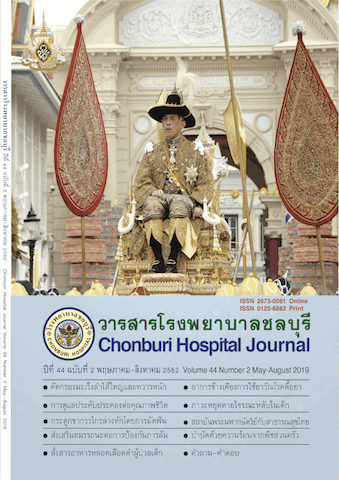The Effect of Self-Efficacy Enhancement Program on Fall Prevention Behaviors and Physical Capabilities of the Elderly Persons in Community
Keywords:
elderly, fall, prevention, self-efficacyAbstract
This Quasi-experimental research was aimed to study effects of self- efficacy enhancement program on fall prevention behaviors and physical capabilities of older person who had fall risk in community. The sample consisted of 60 subjects, they were divided into 2 group, 30 subjects for experimental group and 30 subjects for comparison group. Instrument composed of personal Information Interview, Time up and go test and fall prevention behavior interview, approved by 5 experts for content validity. The Cronbach’s alpha coefficient of fall prevention behavior interview was 0.79. The experimental group was administered a Self- efficacy enhancement program, developed by the researcher based on self-efficacy 4 concepts which included mastery experience, vicarious experience, verbal persuasion and physiological feedback of results. Data were collected from June to July 2018. Descriptive statistics and independent t-test were used to analyze the data.
The results revealed that after completion of the intervention, the experimental group had mean scores of fall prevention behavior and perceived self-efficacy significantly higher than those in the control group. These findings indicate that nurse practitioners who deliver healthcare service for older persons in community should utilize this program through group learning process, role model, skill training of square-stepping exercise that relevance to local culture and community style, for promote fall prevention behaviors modification sustainable.
References
United Nations. World population ageing 2015. New York: The United Nations; 2015.
มูลนิธิสถาบันวิจัยและพัฒนาผู้สูงอายุไทย. สถานการณ์ ผู้สูงอายุไทย พ.ศ. 2557. กรุงเทพฯ; 2558.
กระทรวงสาธารณสุข. สำนักโรคไม่ติดต่อ. กลุ่มยุทธศาสตร์และแผนงาน. ข้อมูลการพลัดตกหกล้มในผู้สูงอายุ [อินเทอร์เน็ต]. 2558 [เข้าถึงเมื่อ 19 มิถุนายน 2559]. เข้าถึงได้จาก: http://www.thaincd.com/senior-injure- violence/information.php
O’Loughlin JL, Robitaille Y, Boivin JF, Suissa S. Incidence of and risk factors for falls and injurious falls among the community-dwelling elderly. American Journal of Epidemiology 1993; 137: 342-54.
Sattin RW, Huber L, DeVito CA, Rodriguez JG, Ros A, Bacchelli S, et al. The incidence of fall injury events among the elderly in a defined population. American Journal of Epidemiology 1990; 131: 1028-37.
ประเสริฐ อัสสันตชัย. ปัญหาสุขภาพที่พบบ่อยในผู้สูงอายุ และการป้องกัน. กรุงเทพฯ; 2556.
ผ่องพรรณ อรุณแสง. การพยาบาลปัญหาสำคัญของผู้สูงอายุ: การนำไปใช้. ขอนแก่น; 2554.
กิตติพร เนาว์สุวรรณ, ประไพพิศ สิงหเสม, วัลทณี นาคศรีสังข์. สมรรถนะที่จำเป็นต่อการดูแลผู้สูงอายุของพยาบาลวิชาชีพเมื่อเข้าสู่การเป็นสังคมผู้สูงอายุ. วารสารพยาบาลกระทรวงสาธารณสุข 2560; 27: 1-11.
ทิพย์รัตน์ ผลอินทร์, นารีรัตน์ จิตรมนตรี, วิราพรรณ วิโรจน์รัตน์. ความสัมพันธ์ระหว่างปัจจัยส่วนบุคคล ภาวะสุขภาพ ความกลัวการหกล้ม และพฤติกรรมป้องกันการหกล้มของผู้สูงอายุในชุมชน. วารสารพยาบาลศาสตร์ จุฬาลงกรณ์มหาวิทยาลัย 2560; 29: 36-50.
Bandura A. Social learning theory. Englewood Cliffs NJ: Prentice – Hall; 1977.
Resnick B. Self-efficacy. In: Peterson SJ, Bredow TS, editors. Middle range theories: application to nursing research. 3rd ed. Philadelphia: Lippincott Williams & Wilkins; 2013. p. 82-91.
วิทยา วาโย, นารีรัตน์ จิตรมนตรี, วิราพรรณ วิโรจน์รัตน์. ผลของโปรแกรมป้องกันการหกล้มแบบสหปัจจัย ต่อพฤติกรรมการป้องกันการหกล้มของผู้สูงอายุในชุมชน. วารสารการพยาบาลและการดูแลสุขภาพ 2560; 35: 25-33.
ภาวดี วิมลพันธุ์, ขนิษฐา พิศฉลาด. ผลของโปรแกรม ป้องกันการพลัดตกหกล้มต่อการพลัดตกหกล้มในผู้สูงอายุ. วารสารพยาบาลกระทรวงสาธารณสุข 2557; 23: 98-9.
กมลรัตน์ กิตติพิมพานนท์, ผจงจิต ไกรถาวร. การพัฒนารูปแบบการป้องกันการพลัดตกหกล้มของผู้สูงอายุที่อาศัยอยู่ในเขตเมืองกรุงเทพมหานครโดยใช้ชุมชนเป็นฐาน.วารสารพยาบาลสาธารณสุข 2558; 29: 98-113.
ละออม สร้อยแสง, จริยาวัตร คมพยัคฆ์, กนกพร นทีธนสมบัติ. แนวทางการป้องกันการหกล้มในผู้สูงอายุชุมชน มิตรภาพพัฒนา. วารสารพยาบาลทหารบก 2557; 15: 122-9.
Batra A, Melchior M, Seff L, Frederick N, Palmer RC. Evaluation of a community-based falls prevention program in South Florida, 2008-2009. Prev Chronic Dis 2012; 9: E13.
Hu YN, Chung YJ, Yu HK, Chen YC, Tsai CT, Hu GC. Effect of Tai Chi exercise on fall prevention in older adults: systematic review and meta - analysis of randomized controlled trials. International Journal of Gerontology 2016; 10: 131-6.
Cohen J. Statistical power analysis for the behavioral sciences. 2th ed. Hillsdale (NJ): Lawrence Erlbaum Associates; 1988.
Polite DF, Hungler BP. Nursing research principle and method. 6th ed. Philadelphia: Lippincott Williams & Wilkins; 1999.
Podsiadlo D, Richardson S. The timed “up & go” a test of basic functional mobility for frail elderlypersons. Journal of the American Geriatrics Society 1991; 39: 142-8.
ชุติมา ชลายนเดชะ. คัดกรองการล้มด้วย Time Up and Go test (TUG). วารสารเทคนิคการแพทย์ และกายภาพบำบัด 2557; 26: 5-16.
Shumway-Cook A, Brauer S, Woollacott M. Predicting the probability for falls in community dwelling older adults using the Timed Up & Go Test. Physical Therapy 2000; 80: 896-3.
ธัญญรัตน์ อโนทัยสินทวี. รายงานฉบับสมบูรณ์การทบทวนวรรณกรรมอย่างเป็นระบบเรื่องมาตรการป้องกัน การหกล้มในผู้สูงอายุ [อินเทอร์เน็ต]. 2557 [เข้าถึงเมื่อ19 มิถุนายน 2559]. เข้าถึงได้จาก: http://www. hitap. net/documents/24277
วิลาวรรณ สมตน, ทัศนีย์ รวิวรกุล, ขวัญใจ อำนาจ สัตย์ซื่อ. ผลของโปรแกรมป้องกันการหกล้มสำหรับผู้สูงอายุ [วิทยานิพนธ์ปริญญาวิทยาศาสตรมหาบัณฑิต]. คณะ สาธารณสุขศาสตร์, กรุงเทพมหานคร: มหาวิทยาลัยมหิดล; 2557.
วลัยภรณ์ อารีรักษ์. ผลของโปรแกรมการส่งเสริมพฤติกรรมการป้องกันการหกล้มต่อการรับรู้ความสามารถตนเอง ความคาดหวังผลดีจากการปฏิบัติและพฤติกรรมการป้องกันการหกล้มของผู้สูงอายุที่มีความเสี่ยงต่อการหกล้มใน- ชุมชน [วิทยานิพนธ์ปริญญาพยาบาลศาสตรมหาบัณฑิต]. สาขาวิชาการพยาบาลผู้สูงอายุ, คณะพยาบาลศาสตร์, ชลบุรี: มหาวิทยาลัยบูรพา; 2554.
Lee LL, Arthur A, Avis M. Using self-efficacy theory to develop intervention the older people overcome psychological barriers to physical activity: a discussion paper. International Journal of Nursing Studies 2008; 45: 1690-9.
เจริญ กระบวนรัตน์. ตาราง 9 ช่องกับการพัฒนาสมอง. กรุงเทพฯ; 2558.
Harniratisai T, Thongtawee B, Raetong P. The effects of a physical activity program for fall prevention among Thai older adults. Pacific Rim International Journal of Nursing Research 2015; 19: 4-8.
สมหญิง ไทยนิมิต, อวยพร ตั้งธงชัย, พรชัย จูลเมตต์. รายงานวิจัยฉบับสมบูรณ์การฝึกสอน (Coaching) การออกกำลังกายของผู้สูงอายุด้วยกล้องคินเน็คท์ (Kinect). สำนักงานกองทุนสนับสนุนการสร้างเสริมสุขภาพ; 2559.
จันทนา รณฤทธิวิชัย, ถนอมขวัญ ทวีบูรณ์, สมจินต์-เพชรพันธุ์ศรี, รัชนี ศุจิจันทรรัตน์, ณัฐสุรางค์ บุญจันทร์, จันทนี กฤดิบวร. การประเมินสมรรถภาพกายก่อนและหลัง การออกกำลังกายแอโรบิก แบบตารางเก้าช่องและยืดเหยียดกล้ามเนื้อโดยใช้ยางยืดของผู้สูงอายุในโครงการส่งเสริมสุขภาพผู้สูงอายุ, คณะพยาบาลศาสตร์ มหาวิทยาลัยมหิดล. วารสารพยาบาลศาสตร์ 2553; 27: 68-77.
Stubbs B, Brefka S, Denkinger M. What works to prevent falls in community dwellingolder adults? Umbrella review of meta – analyses of randomized controlled trials. Physical Therapy 2015; 80: 1095-110.
Day LM. Fall prevention programs for community– dwelling older people should primary target a multifactorial intervention rather than exercise as s single intervention. JAGS 2013; 61: 284-85.
Sherrington C, Tiedemann A, Fairhall N, Close JCT, Lord SR. Exercise to prevent falls in older adults: an updated meta-analysis and best practice recommendations. NSW Public Health Bulletin 2011; 22: 78-83
Downloads
Published
Versions
- 2026-02-18 (2)
- 2019-08-25 (1)
Issue
Section
License
Copyright (c) 2019 Chonburi Hospital Journal

This work is licensed under a Creative Commons Attribution-NonCommercial-NoDerivatives 4.0 International License.
บทความที่ได้รับการตีพิมพิ์เป็นลิขสิทธิ์ของวารสารโรงพยาบาลชลบุรี
